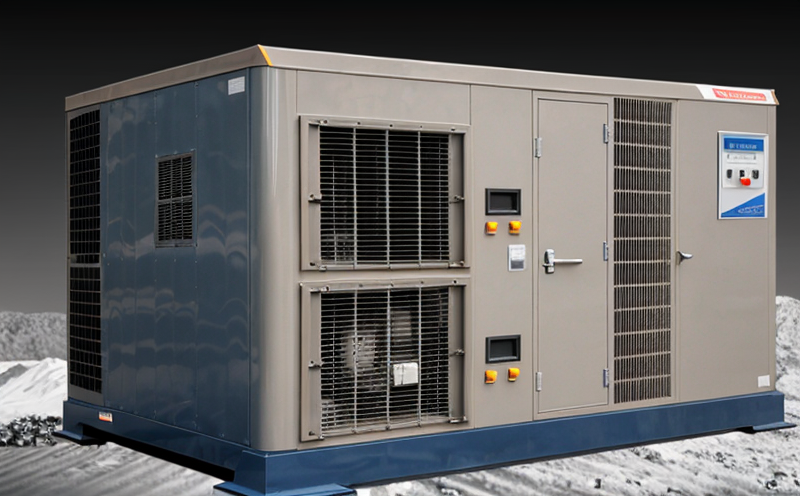ASTM E698 Thermal Reaction Kinetics Analysis Testing
The ASTM E698 standard is a crucial tool in the semiconductor and microchip testing sector, enabling the evaluation of thermal reaction kinetics. This service helps ensure that materials used in these components undergo rigorous testing to meet stringent quality standards.
This method assesses how chemical reactions proceed under heat, which is essential for understanding the behavior of semiconductors and microchips at elevated temperatures. By analyzing the rate constants and activation energies, manufacturers can predict material stability, improve design, and enhance reliability.
The ASTM E698 procedure involves subjecting samples to controlled temperature changes in a calorimeter. The aim is to measure the heat generated or absorbed during these reactions, which provides insights into the materials' thermal stability. This data is vital for ensuring that components function correctly under various environmental conditions and stress levels.
For R&D engineers, this testing method offers valuable information on material compatibility and potential failure points. Compliance officers can use it to ensure product compliance with international standards like ASTM E698, thereby safeguarding their brand reputation and customer trust.
The process requires precise sample preparation, including ensuring uniformity in size and purity. The chosen calorimeter must be capable of maintaining accurate temperature control throughout the test duration. This ensures reliable data collection that can accurately reflect the material's behavior under thermal stress.
ASTM E698 testing is particularly important for materials used in high-performance electronics, where even minor changes in thermal stability can lead to significant performance issues or failures. By leveraging this service, manufacturers can identify and mitigate potential risks early in the product lifecycle, leading to more robust and reliable end products.
The results of ASTM E698 testing are critical for quality assurance teams as they provide a clear picture of how materials will perform under thermal stress. This information is invaluable for making informed decisions about material selection and process optimization.
Scope and Methodology
| Aspect | Description |
|---|---|
| Test Specimens | The samples tested are typically small pieces of the material, usually in a form that allows for accurate heat transfer and measurement. |
| Calorimeter Type | A differential scanning calorimeter (DSC) or isothermal microcalorimeter (IMC) are commonly used to measure the thermal reaction kinetics. |
| Temperature Range | The test typically covers a wide range of temperatures, from ambient up to several hundred degrees Celsius, depending on the material properties and application requirements. |
| Rates of Heating/cooling | The heating or cooling rates can vary based on the specific needs of the sample. Rates are usually controlled within narrow ranges to ensure accurate measurements. |
| Data Collection | Temperature and heat flow data are recorded at regular intervals during the test, providing a comprehensive dataset for analysis. |
Benefits
The ASTM E698 Thermal Reaction Kinetics Analysis Testing offers numerous benefits to semiconductor and microchip manufacturers. It helps in identifying the optimal operating conditions for materials, ensuring that they perform reliably under thermal stress.
By understanding how materials behave at high temperatures, manufacturers can design components that are more resistant to degradation and failure. This leads to longer product lifetimes and reduced maintenance costs.
The test also aids in optimizing manufacturing processes by providing insights into the heating and cooling rates required for best results. This can lead to improved efficiency and cost savings throughout the production cycle.
Furthermore, ASTM E698 testing ensures compliance with international standards like ASTM E698 itself, which enhances product quality and reliability. This is crucial in maintaining a competitive edge in the market and building customer trust.
The data obtained from this testing can be used to predict material performance under various environmental conditions. This predictive capability allows manufacturers to make informed decisions about material selection and process optimization, leading to more robust and reliable end products.
Quality and Reliability Assurance
The ASTM E698 Thermal Reaction Kinetics Analysis Testing plays a pivotal role in quality assurance programs by providing critical data on material behavior under thermal stress. This ensures that the final products meet high-quality standards and are reliable over their intended lifetimes.
By identifying potential weak points early in the development process, manufacturers can address them before they become significant issues. This proactive approach not only improves product quality but also reduces the risk of costly recalls or field failures.
The test results are a key factor in assessing material compatibility and ensuring that all components work seamlessly together under thermal stress conditions. This is especially important for complex assemblies where individual parts must perform optimally when combined.
Compliance with ASTM E698 standards also enhances the reputation of manufacturers, as it demonstrates commitment to excellence and adherence to international quality benchmarks. This can be a significant advantage in competitive markets, helping companies gain a stronger foothold among customers who value reliability and performance.





